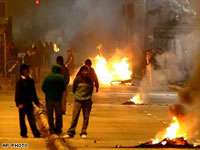Alarm in Chile after deadly riots
A policeman was killed in clashes through the night on the anniversary of a 1973 military coup. Authorities fear of gang bandits linked to drug trafficking.

Chilean authrotities expressed their concern on the bloody clashes that left one policeman killed and tens of injured through the night on the anniversary of the 1973 military coup that toppled the constitutional government of Socialist president Salvador Allende.
As night fell Tuesday in Santiago and demonstrations to commemorate the victims of Gen. Augusto Pinochet’s victims peacefully dissolved, masked youths erected flaming barricades on the streets of the city slums. Thousands of rampaging youths turned the surrounding areas of the Capital into chaos killing a policeman and seriously wounding 41 others.
According to the preliminary investigation ordered by the Interior Ministry, the policeman was shot in his head by an automatic gun. The police squad was spotted by crossed fire coming from three directions. Authorities believe that the murder was planned and could be connected with bandits linked to drug trafficking.
The government reported that 304 arrests as looters badly damaged several shops, seven schools and a gas station. Rioters threw chains on power lines, knocking out electricity to more than 140,000 homes. On Thursday, electricity was gradually restored to the affected areas.
Riots took authorities by surprise. President Michelle Bachelet ordered the Interior Ministry to file criminal charges against those responsible and said the violence was an affront to those honoring the victims of the 1973-1990 dictatorship. She visited wounded policemen at a hospital and said the government would "take all possible measures" to prevent a repeat of such violence.
According to observers, incidents took place in the slums where survive as much of the 13.7% of people living under the poverty line. These slums were created under Pinochet dictatorship as the military government decided to move out all poor families from central Santiago.
Poverty and lack of essential services turned these areas into a source of opposition to Pinochet. But their situation was not eased by the democratic administrations that rule the country since 1990.
While violent protests have accompanied the coup anniversary for years, officials appeared taken aback this year by the rioting and the participation of many youths aged 16 or younger. "We were surprised by the amount of firearms used," Santiago regional Gov. Adriana Delpiano said.
Deputy Interior Minister Felipe Harboe said the protests should not be considered political in nature, and Defense Minister Jose Goni said criminals and vandals _ not demonstrators _ were behind the unrest.
Tuesday riots come as Michelle Bachelet’s presidency is being harashly challenged by different sectors. Students led violent protests last year to improve public education. Earlier this year bus drivers led massive demonstrations to protest reforms introduced in public transportation. A few days ago, the government faced tough protests led by trade unions.
Subscribe to Pravda.Ru Telegram channel, Facebook, RSS!


